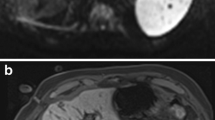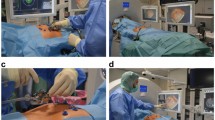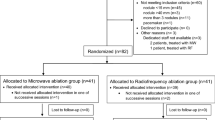Abstract
The local effectiveness and clinical usefulness of multipolar radiofrequency (RF) ablation of liver tumours was evaluated. Sixty-eight image-guided RF sessions were performed using a multipolar device with bipolar electrodes in 53 patients. There were 45 hepatocellular carcinomas (HCC) and 42 metastases with a diameter ≤3 cm (n = 55), 3.1–5 cm (n = 29) and >5 cm (n = 3); 26 nodules were within 5 mm from large vessels. Local effectiveness and complications were evaluated after RF procedures. Mean follow-up was 17 ± 10 months. Recurrence and survival rates were analysed by the Kaplan-Meier method. The primary and secondary technical effectiveness rate was 82% and 95%, respectively. The major and minor complication rate was 2.9%, respectively. The local tumour progression at 1- and 2-years was 5% and 9% for HCC nodules and 17% and 31% for metastases, respectively; four of 26 nodules (15%) close to vessels showed local progression. The survival at 1 year and 2 years was 97% and 90% for HCC and 84% and 68% for metastases, respectively. Multipolar RF technique creates ablation zones of adequate size and tailored shape and is effective to treat most liver tumours, including those close to major hepatic vessels.




Similar content being viewed by others
References
Livraghi T, Meloni F, Morabito A, Vettori C (2004) Multimodal image-guided tailored therapy of early and intermediate hepatocellular carcinoma: long-term survival in the experience of a single radiologic referral center. Liver Transpl 10(2 Suppl 1):98–106
Lencioni R, Cioni D, Crocetti L, Franchini C, Pina CD, Lera J, Bartolozzi C (2005) Early-stage hepatocellular carcinoma in patients with cirrhosis: long-term results of percutaneous image-guided radiofrequency ablation. Radiology 234:961–967
Lu DS, Yu NC, Raman SS, Lassman C, Tong MJ, Britten C, Durazo F, Saab S, Han S, Finn R, Hiatt JR, Busuttil RW (2005) Radiofrequency ablation of hepatocellular carcinoma: treatment success as defined by histologic examination of the explanted liver. Radiology 234:954–960
Bruix J, Sherman M (2005) Management of hepatocellular carcinoma. Hepatology 42:1208–1236
Livraghi T, Solbiati L, Meloni F, Ierace T, Goldberg SN, Gazelle GS (2003) Percutaneous radiofrequency ablation of liver metastases in potential candidates for resection: the “test-of-time approach”. Cancer 97:3027–3035
Poston GJ (2005) Radiofrequency ablation of colorectal liver metastases: where are we really going? J Clin Oncol 23:1342–1344
Solbiati L, Livraghi T, Goldberg SN, Ierace T, Meloni F, Dellanoce M, Cova L, Halpern EF, Gazelle GS (2001) Percutaneous radio-frequency ablation of hepatic metastases from colorectal cancer: long-term results in 117 patients. Radiology 221:159–166
Gillams AR, Lees WR (2004) Radio-frequency ablation of colorectal liver metastases in 167 patients. Eur Radiol 14:2261–2267
Berber E, Pelley R, Siperstein AE (2005) Predictors of survival after radiofrequency thermal ablation of colorectal cancer metastases to the liver: a prospective study. J Clin Oncol 23:1358–1364
Goldberg SN, Hahn PF, Tanabe KK, Mueller PR, Schima W, Athanasoulis CA, Compton CC, Solbiati L, Gazelle GS (1998) Percutaneous radiofrequency tissue ablation: does perfusion-mediated tissue cooling limit coagulation necrosis? J Vasc Interv Radiol 9:101–111
Mulier S, Miao Y, Mulier P, Dupas B, Pereira P, de Baere T, Lencioni R, Leveillee R, Marchal G, Michel L, Ni Y (2005) Electrodes and multiple electrode systems for radiofrequency ablation: a proposal for updated terminology. Eur Radiol 15:798–808
Pereira PL, Trubenbach J, Schenk M, Subke J, Kroeber S, Schaefer I, Remy CT, Schmidt D, Brieger J, Claussen CD (2004) Radiofrequency ablation: in vivo comparison of four commercially available devices in pig livers. Radiology 232:482–490
Denys AL, De Baere T, Kuoch V, Dupas B, Chevallier P, Madoff DC, Schnyder P, Doenz F (2003) Radio-frequency tissue ablation in the liver: in vivo and in vitro experiments with four different systems. Eur Radiol 13:2346–2352
McGahan JP, Gu WZ, Brock JM, Tesluk H, Jones CD (1996) Hepatic ablation using bipolar radiofrequency electrocautery. Acad Radiol 3:418–422
Burdio F, Guemes A, Burdio JM, Navarro A, Sousa R, Castiella T, Cruz I, Burzaco O, Lozano R (2003) Bipolar saline-enhanced electrode for radiofrequency ablation: results of experimental study of in vivo porcine liver. Radiology 229:447–456
Lee FT Jr, Haemmerich D, Wright AS, Mahvi DM, Sampson LA, Webster JG (2003) Multiple probe radiofrequency ablation: pilot study in an animal model. J Vasc Interv Radiol 14:1437–1442
Tacke J, Mahnken A, Roggan A, Gunther RW (2004) Multipolar radiofrequency ablation: first clinical results. Rofo 176:324–329
Frericks BB, Ritz JP, Roggan A, Wolf KJ, Albrecht T (2005) Multipolar radiofrequency ablation of hepatic tumors: initial experience. Radiology 237:1056–1062
Bruix J, Sherman M, Llovet JM, Beaugrand M, Lencioni R, Burroughs AK, Christensen E, Pagliaro L, Colombo M, Rodes J, EASL Panel of Experts on HCC (2001) Clinical management of hepatocellular carcinoma. Conclusions of the Barcelona-2000 EASL conference. European Association for the Study of the Liver. J Hepatol 35:421–430
Lu DS, Raman SS, Vodopich DJ, Wang M, Sayre J, Lassman C (2002) Effect of vessel size on creation of hepatic radiofrequency lesions in pigs: assessment of the “heat sink” effect. AJR Am J Roentgenol 178:47–51
Kelekis AD, Terraz S, Roggan A, Terrier F, Majno P, Mentha G, Roth A, Becker CD (2003) Percutaneous treatment of liver tumors with an adapted probe for cooled-tip, impedance-controlled radio-frequency ablation under open-magnet MR guidance: initial results. Eur Radiol 13:1100–1105
Veltri A, Moretto P, Doriguzzi A, Pagano E, Carrara G, Gandini G (2006) Radiofrequency thermal ablation (RFA) after transarterial chemoembolization (TACE) as a combined therapy for unresectable non-early hepatocellular carcinoma (HCC). Eur Radiol 16:661–669
Elias D, Sideris L, Pocard M, Dromain C, De Baere T (2004) Intraductal cooling of the main bile ducts during radiofrequency ablation prevents biliary stenosis. J Am Coll Surg 198:717–721
Goldberg SN, Grassi CJ, Cardella JF, Charboneau JW, Dodd GD 3rd, Dupuy DE, Gervais D, Gillams AR, Kane RA, Lee FT Jr, Livraghi T, McGahan J, Phillips DA, Rhim H, Silverman SG, Society of Interventional Radiology Technology Assessment Committee; International Working Group on Image-Guided Tumor Ablation (2005) Image-guided tumor ablation: standardization of terminology and reporting criteria. Radiology 235:728–739
Rosset A, Spadola L, Ratib O (2004) OsiriX: an open-source software for navigating in multidimensional DICOM images. J Digit Imaging 17:205–216
Leoni CJ, Potter JE, Rosen MP, Brophy DP, Lang EV (2001) Classifying complications of interventional procedures: a survey of practicing radiologists. J Vasc Interv Radiol 12:55–59
Goldberg SN, Solbiati L, Halpern EF, Gazelle GS (2000) Variables affecting proper system grounding for radiofrequency ablation in an animal model. J Vasc Interv Radiol 11:1069–1075
Desinger K, Stein T, Tschepe J, Mueller G (1996) Investigations on radio-frequency current applications in bipolar technique for interstitial therotherapy (RF-ITT). Minim Invasive Med 7:92–97
Haemmerich D, Staelin ST, Tungjitkusolmun S, Lee FT Jr, Mahvi DM, Webster JG (2001) Hepatic bipolar radio-frequency ablation between separated multipronge electrodes. IEEE Trans Biomed Eng 48:1145–1152
Veenendaal LM, Borel Rinkes IH, van Hillegersberg R (2006) Multipolar radiofrequency ablation of large hepatic metastases of endocrine tumours. Eur J Gastroenterol Hepatol 18:89–92
de Baere T, Risse O, Kuoch V, Dromain C, Sengel C, Smayra T, Gamal El Din M, Letoublon C, Elias D (2003) Adverse events during radiofrequency treatment of 582 hepatic tumors. Am J Roentgenol 181:695–700
Livraghi T, Solbiati L, Meloni MF, Gazelle GS, Halpern EF, Goldberg SN (2003) Treatment of focal liver tumors with percutaneous radio-frequency ablation: complications encountered in a multicenter study. Radiology 226:441–451
Teratani T, Yoshida H, Shiina S, Obi S, Sato S, Tateishi R, Mine N, Kondo Y, Kawabe T, Omata M (2006) Radiofrequency ablation for hepatocellular carcinoma in so-called high-risk locations. Hepatology 43:1101–1108
Jaskolka JD, Asch MR, Kachura JR, Ho CS, Ossip M, Wong F, Sherman M, Grant DR, Greig PD, Gallinger S (2005) Needle tract seeding after radiofrequency ablation of hepatic tumors. J Vasc Interv Radiol 16:485–491
Haemmerich D, Wright AW, Mahvi DM, Lee FT Jr, Webster JG (2003) Hepatic bipolar radiofrequency ablation creates coagulation zones close to blood vessels: a finite element study. Med Biol Eng Comput 41:317–323
Clasen S, Schmidt D, Boss A, Dietz K, Krober SM, Claussen CD, Pereira PL (2006) Multipolar radiofrequency ablation with internally cooled electrodes: experimental study in ex vivo bovine liver with mathematic modeling. Radiology 238:881–890
Lee JM, Han JK, Lee JY, Kim SH, Choi JY, Lee MW, Choi SH, Eo H, Choi BI (2006) Hepatic radiofrequency ablation using multiple probes: ex vivo and in vivo comparative studies of monopolar versus multipolar modes. Korean J Radiol 7:106–117
Laeseke PF, Sampson LA, Haemmerich D, Brace CL, Fine JP, Frey TM, Winter TC 3rd, Lee FT Jr (2006) Multiple-electrode radiofrequency ablation creates confluent areas of necrosis: in vivo porcine liver results. Radiology 241:116–124
Burdio F, Navarro A, Sousa R, Burdio JM, Guemes A, Gonzalez A, Cruz I, Castiella T, Lozano R, Berjano E, Figueras J, de Gregorio MA (2006) Evolving technology in bipolar perfused radiofrequency ablation: assessment of efficacy, predictability and safety in a pig liver model. Eur Radiol 16:1826–1834
Tateishi R, Shiina S, Teratani T, Obi S, Sato S, Koike Y, Fujishima T, Yoshida H, Kawabe T, Omata M (2005) Percutaneous radiofrequency ablation for hepatocellular carcinoma. An analysis of 1000 cases. Cancer 103:1201–1209
Raut CP, Izzo F, Marra P, Ellis LM, Vauthey JN, Cremona F, Vallone P, Mastro A, Fornage BD, Curley SA (2005) Significant long-term survival after radiofrequency ablation of unresectable hepatocellular carcinoma in patients with cirrhosis. Ann Surg Oncol 12:616–628
Shibata T, Shibata T, Maetani Y, Isoda H, Hiraoka M (2006) Radiofrequency ablation for small hepatocellular carcinoma: prospective comparison of internally cooled electrode and expandable electrode. Radiology 238:346–353
Lin SM, Lin CJ, Lin CC, Hsu CW, Chen YC (2005) Randomised controlled trial comparing percutaneous radiofrequency thermal ablation, percutaneous ethanol injection, and percutaneous acetic acid injection to treat hepatocellular carcinoma of 3 cm or less. Gut 54:1151–1156
Acknowledgements
The authors would like to thank André Roggan, PhD, for his excellent advice and technical support.
Author information
Authors and Affiliations
Corresponding author
Rights and permissions
About this article
Cite this article
Terraz, S., Constantin, C., Majno, P.E. et al. Image-guided multipolar radiofrequency ablation of liver tumours: initial clinical results. Eur Radiol 17, 2253–2261 (2007). https://doi.org/10.1007/s00330-007-0626-x
Received:
Revised:
Accepted:
Published:
Issue Date:
DOI: https://doi.org/10.1007/s00330-007-0626-x




